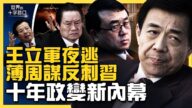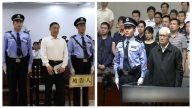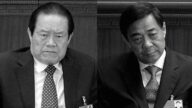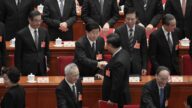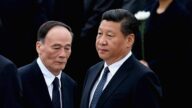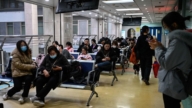【新唐人2013年09月06日訊】中國國營企業中石油腐敗風暴,蔓延到海外。據了解,中石油在美國遭到一名投資者起訴,主要是針對中石油沒有向投資者公告公司內部腐敗問題,違反了美國《證券法》,同時起訴包括董事長兼總裁周吉平在內的4名現任及前任公司管理層。
中石油最近醜聞不斷,繼上週有多名高管落馬之後,4號又傳出中石油的4名高階主管被告上美國聯邦法庭事件。
一名投資者向美國曼哈頓聯邦法院控告,中石油在8月25號已接獲上級部門通知,有4名管理層因涉嫌嚴重違紀接受調查,但在27號才對外公布,中石油沒有即時披露公司內部的腐敗問題,明顯違反美國《證券法》。
這名投資者表示,在8月28號,有消息披露中國有關部門正就腐敗問題對中石油管理層作出調查,當日中石油股價下跌超過3.5%,中石油H股和崑崙能源市值合計蒸發逾217億元。
與此同時,市場擔憂中石油恐怕會遭到美國證券交易委員(SEC)的質詢。美國翰宇國際律師事務所的合夥人Daniel Roules認為,美國證券交易委員將對北京的調查作出回應,他們會向中石油發出更多質問。
美國南加州大學公共政策博士葉科:「這次中石油的股票大跌,事實上是反應中石油內部重重問題的一個反應,直接就反應出投資者的心理,包括中石油這樣的很多大型國企,它的經濟效益其實是很差的,它真正賺取的利潤都是因為壟斷的地位,或者是信息不公開,很多甚至是造假,各種其他手段,真正如果帳務透明的話,然後允許自由審查財務公開的話,其實裡面的黑幕一下子就能反映出來。」
在香港上市的中石油股價雖然稍微止跌,但過去4個交易日,在中國和香港上市的「中石油系」企業股價纍計蒸發市值超過380億元人民幣。
美國南加州大學公共政策博士葉科:「中國的企業,尤其是國企,它受政治因素的影響非常大,企業的發展決定因素,事實上不是它本身業務經營的發展,而是在很大程度上的政治立場、政治資源,一旦政治上有很大的變動,那麼這個企業就會受到很大的衝擊,現在中石油就是這樣的狀況。」
財經專家鄭作時也發表文章指出,一個國家的大企業,都是久經市場考驗之後不死的競爭個體,所以危機來臨的時候,大企業起到了支撐作用。而中國的大型央企們,可以很輕易地看出他們的效率是最為低下的。
獨立評論員李善鑒:「中國的國有企業上市,本身就是一個怪胎,為甚麼這麼講,股票上市在市場經濟的社會,它的資產應該是由股東來控制,整個企業也要為股東來服務,可是中國央企完全不是這樣,整個是被國家來控制的,那麼它的利潤、賺的錢,錢到哪裏去?從哪來到哪去?整個就是一個黑箱不透明的。」
據大陸媒體《21世紀經濟報導》披露,隨著中石油腐敗案爆發,截止9月4號,崑崙能源、惠生工程、明星電纜受中石油牽連最為嚴重。其中,被外界認為與中共前常委周永康的兒子周斌有密切關係的惠生工程,9月2號開市急跌16.5%後停牌,至今仍未復牌。分析指出,這次事件含政治意味,主要是想處理周永康的勢力。
採訪/陳漢 編輯/黃億美 後製/鍾元
China National Petroleum Corruption Scandal Extends Overseas
The corruption scandal involving China National
Petroleum Corp (CNPC) has extended overseas.
Media report that PetroChina, a HK listed subsidiary
of the CNPC, was sued by an investor in the USA.
PetroChina is accused of failure to make timely
disclosure of information on being probed for corruption.
This is against the U.S. Securities Act.
PetroChina President, Zhou Jiping, and three
other top executives are named in the lawsuit.
The CNPC has recently been riddled with scandals,
since its four executives were sacked last week.
On September 4, another four senior managers
of PetroChina were sued in the USA.
Reportedly, an investor has filed a complaint
against PetroChina in a Manhattan federal court.
On August 25, the superior authorities informed
PetroChina that its executives are being probed.
This is related to serious disciplinary violation.
Yet, PetroChina didn’t disclose the
information to investors until August 27.
This practice was in violation of the US Securities Act.
The investor alleged that on August 28, PetroChina stock
dropped over 3.5% when news broke about the probe.
The company lost 21.7 Billion yuan on the value
of its H Shares and of Kunlun Energy shares.
It is speculated that PetroChina may face queries
by the US Securities and Exchange Commission(SEC).
Reportedly, Daniel Roules, a partner at the
US law firm Squire Sanders, commented.
“I expect the SEC to respond to the Chinese
investigation by asking PetroChina more questions."
Ye Ke, Public Policy expert, USA: “The recent plummet
of PetroChina stock mirrors the company’s internal mess.
It also reflects the psychology of investors.
Lots of large Chinese state-owned enterprises, including
PetroChina, have actually had very poor performance.
They have gained profits through monopolies, by
keeping information private, or by counterfeiting.
Openness on financial disclosure
can reveal the inside story."
So far, prices of PetroChina shares
have somewhat stabilized.
Yet, its shares value, in the past four trading
days, has evaporated 38 Billion yuan.
Ye Ke: “China’s enterprises, especially the
SOEs, are heavily subject to political influence.
Their development has never relied on business
success, but their political stance and resources.
Any major political change can severely hammer
the enterprises, and PetroChina is a good example."
Financial expert, Zheng Zuoshi, commented in an article.
He writes, “usually in a country, large enterprises
are winners, after years of market competition.
So in the tide of crisis, large enterprises
are the backbones of the industries.
However it’s easy to see that China’s
central SOEs have the lowest efficiency."
Li Shanjian, commentator: “Chinese SOEs’
going public is interesting in itself. Why?
In a market economy, shareholders control the assets
of a listed company, which works for the shareholder.
But Chinese SOEs are totally different.
They are completely controlled by the Communist
authorities, so where do their profits end up?
And where does the capital come from?
It’s an opaque black box as a whole."
China’s 21st Century Business Herald reports
that three PetroChina subsidiaries have become deeply entangled in the corruption scandal.
The list includes Kunlun Energy,
Wison Engineering, and Star Cable.
Zhou Bin is rumored to be the big
boss behind Wison Engineering.
He is the son of Zhou Yongkang, former
Politburo Standing Committee member.
On September 2, Wison Engineering stock
plummeted 16.5% before trading was suspended.
The suspension still continues.
Observers say that this smacks of politics, which
aims at purging the forces of Zhou Yongkang.



